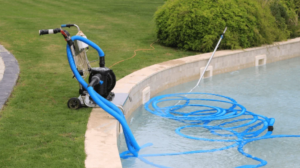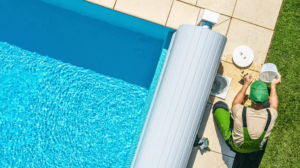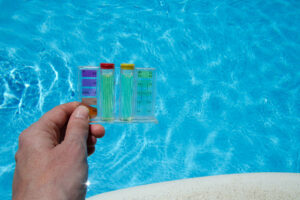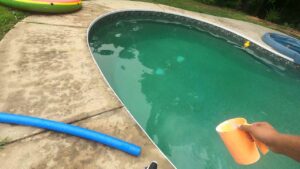Ever dreamed of diving into your own backyard oasis, only to realize the process involves more than picking a pool design? Building your dream pool in Pennsylvania is an exciting project, but it comes with a maze of regulations that can catch even the savviest homeowner off guard. This guide breaks down the essential permits you need for swimming pool installation, ensuring your project stays compliant and stress-free. You’ll learn which permits apply, how to navigate local requirements, and tips to avoid costly delays, all tailored to Pennsylvania homeowners eager to make a splash.
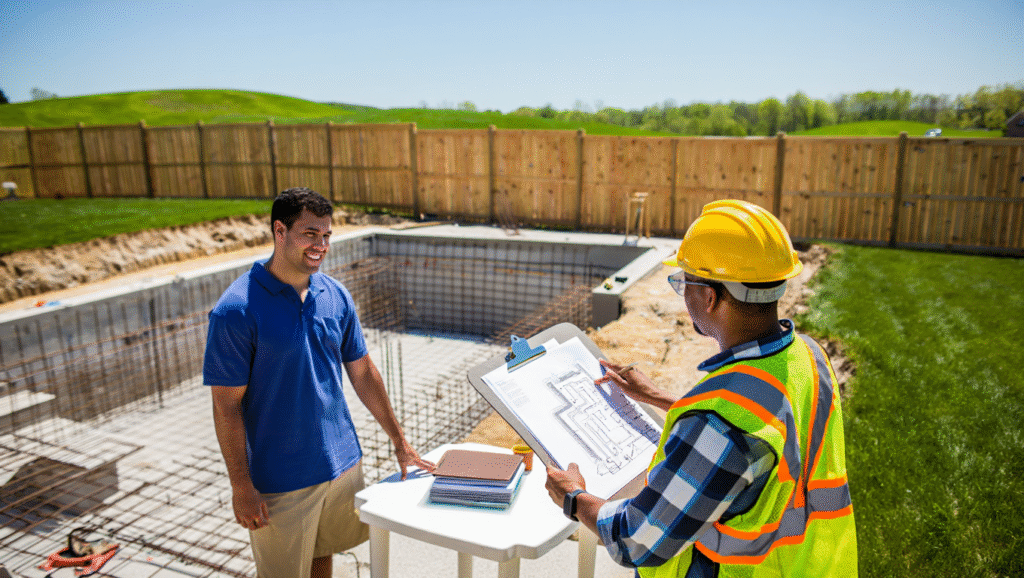
Why Permits Matter for Your Pool Project
Swimming pool permits aren’t just bureaucratic hoops—they’re your ticket to a safe and lasting pool. In Pennsylvania, permits ensure your installation meets safety standards, protects the environment, and aligns with local zoning laws. Skipping them can lead to fines, forced removal of your pool, or even safety hazards like faulty electrical systems. For example, a homeowner in Lancaster faced a $5,000 fine for unpermitted pool work that violated setback rules. Getting the right permits upfront saves you headaches and keeps your investment secure.
Permits also signal quality. At Poseidon’s Custom Pools, we’ve seen how proper permitting reassures homeowners that their in-ground or above-ground pool is built to last, meeting both state and local codes. Whether you’re planning a sleek in-ground pool or a spacious above-ground model, understanding the permit process is your first step toward a worry-free installation, as outlined by the PHTA professional standards.
Types of Essential Permits for Swimming Pool Installation
Navigating the permit landscape can feel overwhelming, but most Pennsylvania pool projects require a few key approvals. Below, we outline the main permits you’ll need, along with their purpose and typical requirements.
Building Permit
A building permit is the cornerstone of any pool installation. It ensures your pool complies with Pennsylvania’s Uniform Construction Code (UCC), which governs structural safety, electrical systems, and plumbing, aligning with the International Swimming Pool Code. Most municipalities, from Pittsburgh to Philadelphia, require this permit for both in-ground and above-ground pools.
- What it covers: Pool structure, decking, fencing, and essential pool safety features like alarms or covers, as recommended by the CPSC Pool Safely guidelines.
- How to apply: Submit custom pool plans, including pool dimensions, site layout, and safety measures, to your local building department. Expect to pay $100–$500, depending on the project’s scope.
- Pro tip: Check if your contractor, like Poseidon’s Custom Pools, handles permit applications as part of their service—it can save you time.
Zoning Permit
Zoning permits confirm your pool fits within your property’s zoning regulations. These rules dictate where you can place your pool, how close it can be to property lines, and whether it affects protected areas like wetlands. In Pennsylvania, zoning laws vary widely by township or borough.
- What it covers: Pool location, yard layout requirements (often 5–15 feet from property lines), and lot coverage limits.
- How to apply: Contact your local zoning office with a site plan showing your pool’s proposed location. Fees typically range from $50–$200.
- Example: In Bucks County, a homeowner needed a variance to install a pool closer to their neighbor’s fence than the standard 10-foot setback, which required a zoning hearing.
Electrical Permit
If your pool includes lighting, pumps, or heaters, you’ll likely need an electrical permit. This ensures all wiring meets National Electrical Code standards, reducing risks like shocks or fires. Pennsylvania’s strict electrical codes are non-negotiable, especially for in-ground pools with modern pool electrical systems.
- What it covers: Wiring for pool equipment, grounding systems, and GFCI (ground-fault circuit interrupter) outlets.
- How to apply: A licensed electrician typically submits this permit, costing $75–$300. Include schematics of the electrical setup.
- Insight: Faulty wiring caused a pool pump fire in Erie last year—proper permitting could have prevented it.
Plumbing Permit
For pools with filtration systems or water features, a plumbing permit ensures proper water supply and drainage. This is critical in Pennsylvania, where heavy rains can strain local stormwater systems.
- What it covers: Piping for water circulation, backwash systems, and drainage connections.
- How to apply: Submit plumbing plans to your local building department, often alongside the building permit. Fees are usually $50–$150.
- Note: Some municipalities require separate stormwater management plans to prevent runoff issues.
Environmental Permit
If your property is near wetlands, streams, or other protected areas, you may need an environmental permit. Pennsylvania’s Department of Environmental Protection (DEP) enforces strict rules to safeguard natural resources, as outlined in the PA DEP stormwater regulations and EPA water quality standards.
- What it covers: Soil erosion control, wetland protection, and stormwater management.
- How to apply: Work with a surveyor or environmental consultant to assess your site. Submit findings to the DEP or local conservation district. Costs vary widely, from $200 to over $1,000.
- Local nuance: In Chester County, pools near the Brandywine Creek often require DEP approval due to flood plain regulations.
| Permit Type | Purpose | Typical Cost | Who Handles It |
| Building Permit | Structural safety, code compliance | $100–$500 | Contractor or homeowner |
| Zoning Permit | Property placement, setback rules | $50–$200 | Homeowner or surveyor |
| Electrical Permit | Safe wiring, NEC compliance | $75–$300 | Licensed electrician |
| Plumbing Permit | Water systems, drainage | $50–$150 | Plumber or contractor |
| Environmental Permit | Environmental protection | $200–$1,000+ | Environmental consultant |
Pennsylvania-Specific Considerations
Pennsylvania’s diverse geography and local governance mean permit requirements can differ significantly across our Pennsylvania service areas. Urban areas like Philadelphia often have stricter codes than rural townships. For instance, Philly requires pool barriers to be at least 48 inches high, while some rural areas allow 42-inch fences. Here are key factors to consider:
- Local ordinances: Always check with your township or borough. For example, Lower Merion Township mandates pool alarms, while others don’t.
- HOA rules: If you live in a homeowners’ association, their regulations may impose additional requirements, like specific fence designs or pool sizes.
- Historic districts: In places like Gettysburg, historic preservation boards may restrict pool aesthetics to maintain neighborhood character.
- Winter concerns: Pennsylvania’s harsh winters demand durable pool materials and proper drainage to prevent freeze-thaw damage, which inspectors often scrutinize. Learn more about winter pool care to protect your investment.
Contact your local building department early—many offer pre-application consultations to clarify requirements. Poseidon’s Custom Pools, based in Pennsylvania, can guide you through these nuances, leveraging our deep knowledge of local codes.
Common FAQs About Swimming Pool Permits
How long does it take to get pool permits in Pennsylvania?
Approval times vary by municipality. Building and zoning permits typically take 1–4 weeks, while environmental permits can take 6–12 weeks if DEP review is required. Start the process early to avoid delaying your project.
Can I start pool construction before getting permits?
No. Starting work without permits risks fines, stop-work orders, or even pool removal. Always secure approvals first.
Do above-ground pools need permits?
Yes, most Pennsylvania municipalities require building and zoning permits for above-ground pools, especially if they exceed a certain depth (e.g., 24 inches) or include decking.
What happens if I skip permits?
Unpermitted pools can lead to fines (often $500–$5,000), mandatory removal, or legal action. They may also complicate property sales, as buyers demand proof of compliance.
Tips to Streamline the Permit Process
Securing swimming pool permits doesn’t have to be a nightmare. Here are actionable strategies to keep things smooth:
- Hire a local expert: Contractors like Poseidon’s Custom Pools know Pennsylvania’s permitting quirks and can handle applications for you.
- Prepare thorough plans: Detailed site plans and equipment specs speed up approvals. Include measurements, materials, and safety features.
- Check HOA rules early: Get written approval from your homeowners’ association before applying for municipal permits.
- Budget for fees: Set aside $500–$2,000 for permits, depending on your pool’s complexity and location.
- Stay proactive: Follow up with your building department weekly to track application progress.
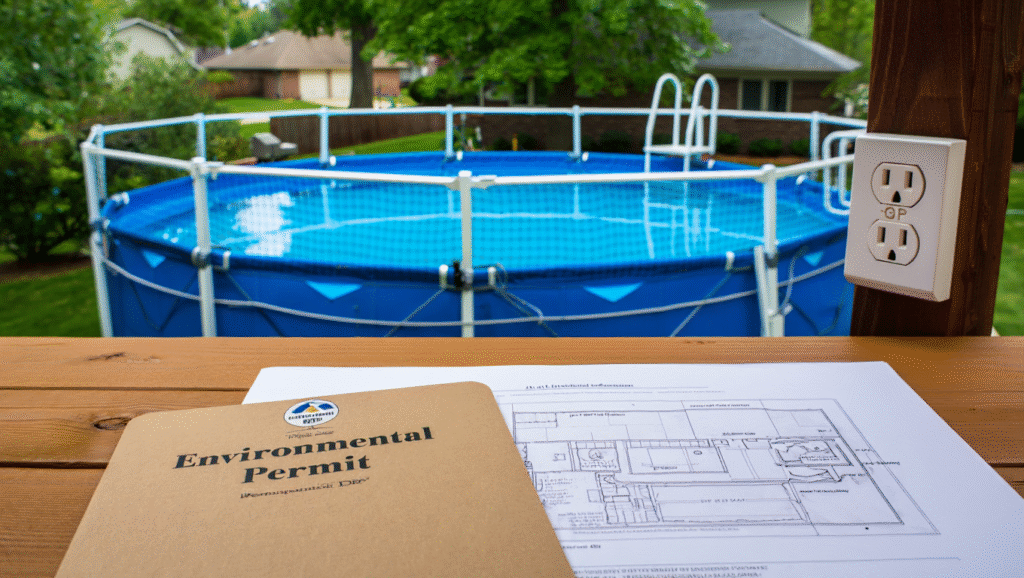
Conclusion
Installing a swimming pool in Pennsylvania is a rewarding investment, but it demands careful attention to swimming pool permits. From building and zoning to electrical and environmental approvals, each permit ensures your pool is safe, legal, and built to last. By understanding local requirements, preparing thorough plans, and working with Poseidon’s expert pool builders, you can navigate the process with confidence. Don’t let red tape dampen your excitement—start planning today to enjoy your stunning backyard pool designs by next summer.
Ready to dive in? Share your pool plans in the comments, or contact Poseidon’s Custom Pools for expert guidance on permits and installation. Let’s make your backyard oasis a reality!

